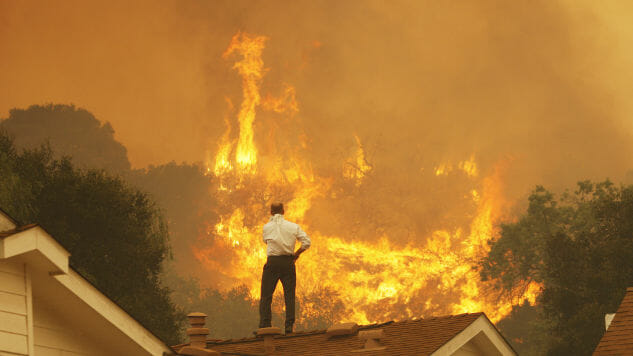All We Need is A Miracle: Trump Withdraws From Paris Accord
On accidents waiting to happen
David McNew / Getty
Humanity (noun): species capable of writing poetry about horses, incapable of calculating the odds at the races.
The future depends on being brave about the right things. Planning for tomorrow is therefore a simple matter of distributing fear correctly. Why is it so difficult, then?
As our species grows in wisdom and ability, we remain disappointingly the same in weighing risk. Our elites are blind to it. By pulling out of the Paris Agreement—and by a dozen other signs—our government shows its inability to understand the world. This weakness is surprisingly widespread.
When we look at the world of tomorrow, we can clearly make out who the chief destroyers will be: The United States and its partners in global warming. We are, it is noted, a huge engine of world-warming. Much as we like to tout our wokeness on multiple levels, America has not stepped back from the ever-looming brink; we stand in proud defiance of nature’s laws. The recent news—Trump shredding the Accord—was to be expected, but that does not make it any less grim for the planet.
For this is the age of misunderstood risks. Trump could do this with impunity because large swathes of the public, and the ruling class, do not accurately understand the risk. One of the clearest signs that humans are not inherently rational is our dim awareness of what risk actually is. Anxiety is an evolutionary response towards threats, but people in general tend to be afraid of the wrong things, at the wrong times, in the wrong ways.
Many of us are afraid to fly on planes. Yet we board our cars without fear. Why? Automobiles are much more dangerous and more likely to murder us at high speeds. We fear dirty bombs, but millions of us smoke, which is sure certain to kill you deader than a knife in a neck vein. And this is true in our politics as well. We misunderstand what we need and why we need it. We reckon with our fears, and not our judgment; we pass up the steak to have a full hour feasting on the garnish.
There have been several books published about this tendency—some of them are recent, and some of those are even readable. The best of these bards of risk is Michael Lewis, who wrote about the human power of danger-calculation in a nonfiction book, The Undoing Project. That work considered the scholarship of two academics, Tversky and Kahneman, who scientifically proved the pervasive patterns of irrationality in human minds—and how we could correct them. Self-awareness is the key. An article in the Times quoted Kahneman: ”“No one ever made a decision because of a number … They need a story.”
In Undoing, Lewis wrote the two best sentences of his career:
-

-

-

-

-

-

-

-

-

-

-

-

-

-

-

-

-

-

-

-

-

-

-

-

-

-

-

-

-

-

-

-

-

-

-

-

-

-

-

-








































